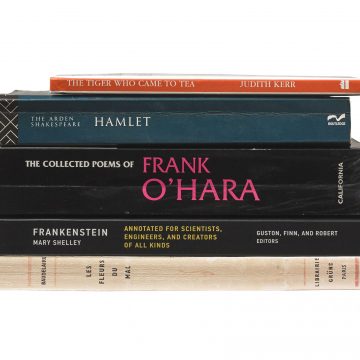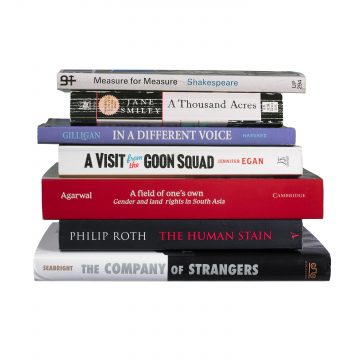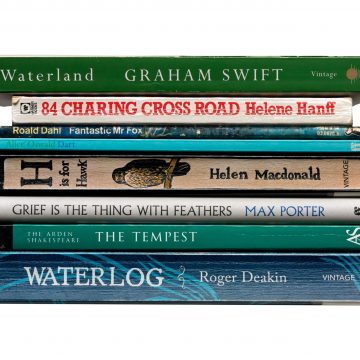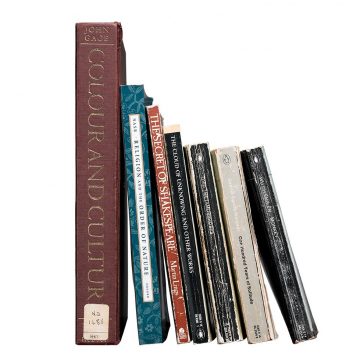I Know What You Read Last Summer
New books, old books and little-known books: leading Cambridge women share their top summer reads

-
Claire Tomalin (Newnham 1951)
Author and journalist
Divided Loyalties: A Scotswoman in Occupied France, by Janet Teissier du Cros (Canongate Classics) is one of the most vivid and extraordinary memoirs I’ve ever read. It’s about the author’s experiences during the second world war, living with her French in-laws and bringing up two little boys while her husband was fighting. It was first published in the 1960s, then republished in the 1990s, and deserves to be a classic.
Tim Parks’s (Downing 1974) An Italian Education (Vintage), is a marvellous book. Each essay is full of interest, and when you come to the end you feel you have been given a very wide perspective and a wonderful overview of Italian literature and history in one highly entertaining and erudite book. And Helen Dunmore’s last novel, Birdcage Walk (Windmill), has all the force and imaginative strength of her other books, as well as that slightly sinister feel about it. I couldn’t stop reading it, and was quite upset by some of it – particularly the young wife who is fascinated by her husband but also frightened of him. It’s a very clever novel, but it’s much more than that. She was a remarkable novelist and poet, and it’s very sad she died.
-
Lucy Mangan (Trinity Hall 1993)
Journalist
Sarah Perry’s The Essex Serpent (Serpent’s Tail) has got everything in it, so subtly and gently. It insinuates, like the serpent itself – it’s like Jane Austen, in that you read through and can’t go back and catch it in the act of greatness, but you know it is great.
I think that Anne Brontë is completely underrated. The Tenant of Wildfell Hall (Penguin), which I first read at Cambridge, just blew my mind; an incredibly modern, distressingly timeless portrait of what we’d now call domestic violence, and alcoholism and a woman who is powerless. And Philippa Pearce’s (Girton 1939) Tom’s Midnight Garden (OUP) remains to me perfection both as a book and as a children’s story. It embodies the art of yearning – it’s just beautiful.
-
Fiona Mozley (King’s 2006)
Novelist
I’m currently reading a collection of short stories, Her Body and Other Parties, by Carmen Maria Machado (Serpent’s Tail). I think of it as a feminist MR James; all the stories are in one way or another terrifying, not strictly speaking ghost stories but really creepy. All of them have a feminist angle or are questioning things about being a woman.
The Woman at 1,000 Degrees by Hallgrímur Helgason (Oneworld) was originally published in Icelandic about six years ago and has only just found its way into English. It’s really wonderful; it’s about an Icelandic woman in her 80s who is living in a garage in Reykjavik with a hand grenade she’s had since the war, and reflecting on her life, including escapades in Britain. It has a very distinctive and funny voice but there’s also a lot that is quite profound.
-
Salley Vickers (Newnham 1967)
Novelist
Penelope Fitzgerald is probably my favourite contemporary author. The Gate of Angels (HarperCollins), which is set in Cambridge, is about a fictitious college called Angel. It’s brilliant, funny, subversive and subtle with an otherworldly dimension, which is what she excels in and I also write about.
William Maxwell, by contrast, is a rather unregarded author, but The Chateâu (Vintage) is a genuinely happy book about an utterly delightful couple in post-war France who are baffled and confused by the reception they receive, yet utterly delighted by Europe. It’s very rare to get a book about a happily married couple and I reread it when I want to be reinvigorated by the possibilities of human relationships.
Rowan Williams’s (Christ’s 1968) book Dostoevsky: Language, Faith and Fiction (Continuum) is also very good indeed. I’m keen on his theology, but he’s also, I think, the greatest living expert on the work of Dostoevsky, who is one of my own favourite novelists. I worked for many years as a psychoanalyst, and Dostoevsky’s psychology is both very dark and very profound.
-
Professor Dame Rosalyn Higgins (Girton 1955)
Former President of the International Court of Justice
Patrick Leigh Fermor’s A Time of Gifts (Hodder) absolutely bowled me over when I first read it. It brought me into an entirely new world. It’s about an 18-year-old who walks across Europe to Constantinople. You are with him every step of the way, every day and every night – you learn all the history he learns and meet the people he meets. It’s a truly astonishing book – one reviewer described it as ‘walking into history’. It’s also the first in a trilogy, which was finally completed by Colin Thubron and Artemis Cooper, so it introduced me to Cooper’s writing too.
I also love pretty well everything by Anthony Trollope – The Eustace Diamonds (Penguin) and Can You Forgive Her? (Penguin) are particularly magnificent. For 10 years, I was the UK member on the UN Human Rights Committee and at one point I was regularly driving back to the UK from Geneva. Listening to Trollope audiobooks was what kept me awake on the journey.
-
Nicola Walker (New Hall 1989)
Actor
I read The Power by Naomi Alderman (Penguin) at Christmas, and didn’t really speak to members of my family for about four days because I kept sloping upstairs to get back to it. It hit at a very good time with the ongoing conversations we’re having about women, and it’s a real page-turner. Then I had another book pressed on me, Shirley Jackson’s We Have Always Lived in the Castle (Penguin), which I thought was remarkable. I went into it thinking it wasn’t for me and then completely fell in love with it.
Eudora Welty’s The Optimist’s Daughter (Virago) was on my reading list for the American paper in my third year at Cambridge, but I never got round to reading it. I’ve literally packed and unpacked it in every flat and every house I’ve lived in since I left, and then for some reason I picked it up last month and it absolutely broke my heart. I think Welty really understands the strange rhythm of grief.
-
Professor Dame Jocelyn Bell Burnell (New Hall 1965)
Astrophysicist
Love of Country: A Hebridean Journey (Granta) by Madeleine Bunting (Corpus 1983) is a contemporary, sympathetic look at the Hebrides that avoids a lot of the romantic guff a lot of writers still fall into when dealing with the islands. Another book about Scotland is Marjory Fleming by Oriel Malet (Persephone), which was originally published in the 1930s; it’s a biographical novel about a Scottish girl who died aged around eight or nine, but clearly would have been a great writer had she lived. She lived in the early 19th century, and her journal is now one of the treasures of the National Library of Scotland.
I bought Hillbilly Elegy: A Memoir of a Family and Culture in Crisis by JD Vance (HarperCollins) at a US airport just after Donald Trump became US president, and it helped me understand how and why he was elected. It’s the autobiography of a young man who started life in a very poor Pennsylvania town and ended up a lawyer in California. It’s been very popular in the US, and it is available here too.
-
Professor Mary Dixon-Woods
Director of The Healthcare Improvement Studies Institute
Excellent Women by Barbara Pym (Virago) is a longstanding favourite of mine. It’s a beautifully observed and very witty story of a single woman in post-war London. Another book that’s delightfully humorous but also has serious intent is Marian Keyes’s Rachel’s Holiday (Penguin) – Rachel, the narrator, is in rehab, and we find out a lot about the nature of addiction.
Abraham Verghese’s Cutting for Stone (Vintage) is very different. It’s a sprawling epic – much of the action takes place in Ethiopia and centres around twin brothers whose mother dies in childbirth, but the novel takes in multiple characters and several continents. And, finally, as an enjoyable way to learn about cognitive psychology and gain some insight into yourself and your fallibilities, it’s hard to beat Mistakes Were Made, But Not by Me by Carol Tarvis and Elliot Aronson (Mariner).
-
Dame Mary Arden (Girton 1965)
Judge
I’m particularly interested in the development of the law. The Lion and the Throne: The Life and Times of Sir Edward Coke by Catherine Drinker Bowen (Little, Brown) was written in 1956 and is one of the best and most readable books about Coke. He was in office during one of the most turbulent times in British history – Elizabeth I and her successor – and was a man of huge energy and rectitude who reshaped history and establish an independent judiciary.
By contrast, The Chattering Wagtails of Mikuyu Prison by Jack Mapanje (Heinemann) demonstrates what happens when you don’t have a free judiciary. Mapanje, a professor of English at the University of Malawi, was imprisoned without trial, apparently for writing his poetry. His poems tell a lot about living a life where there is no rule of law, where people can be imprisoned at whim.
And we’re still constantly invoking John Stuart Mill’s ‘harm principle’ – John Stuart Mill: Victorian Firebrand by Richard Reeves (Atlantic) is a wonderful book about a man who had an extraordinary childhood and could have turned out to be the most awful nerd but, in fact, became a great moderniser. It’s a very human book and an insight into someone who contributed a huge amount to modern society.
-
Professor Dame Ottoline Leyser
Director of the Sainsbury Laboratory
I go to bed at night with my head full of the day’s work concerns, and at night I want to switch off, so my habitual reading is golden age detective fiction. One of the interesting things now is that so many of the books of the era have come back into print, and at the moment I’m working my way through ER Punshon’s very long series about Bobby Owen, which starts with Information Received (Dean Street).
-
Professor Caroline van Eck
Professor of Art History
I’m looking forward to reading the collected letters by Aby Warburg (De Gruyter), one of the founding fathers of global art history. There is at last a new edition of Les Misérables (Pléiade). The book is a wonderful panorama of 19th-century French society, and speaks to us about social exclusion and its costs. Another new Pléiade I’m looking forward to is 1970s situationist writer Georges Perec’s novella Les Choses, a thought-provoking sketch of the present-day obsession with design as a lifestyle.
-
Professor Diane Coyle Bennett
Professor of Public Policy
I read Elena Ferrante’s quartet starting with My Brilliant Friend (Europa) as they came out and I couldn’t read them fast enough. Quite apart from the compelling characters and plot, I liked the portrayal of a very working-class background and the legacy that leaves the main character with – and I don’t think there’s all that much fiction written from that working-class perspective.
Reinventing the Bazaar: A Natural History of Markets by John McMillan (Norton) is just fascinating. I press it on people all the time and I dip into it a lot myself. It’s a book by an economist based on detailed observation of how specific markets work, and it paints a much richer picture of what economics is about than you’d usually get outside the profession.
At the moment, looking at what’s going on in the world, I’d also recommend Second-Hand Time: The Last of the Soviets by Svetlana Alexievich (Fitzcarraldo Editions). And Black Edge by Sheelah Kolhatkar (Random House) is a great book about nefarious goings-on in the financial markets. It reads like a thriller and is about insider dealing by a hedge fund and how the authorities tracked down what was going on.







